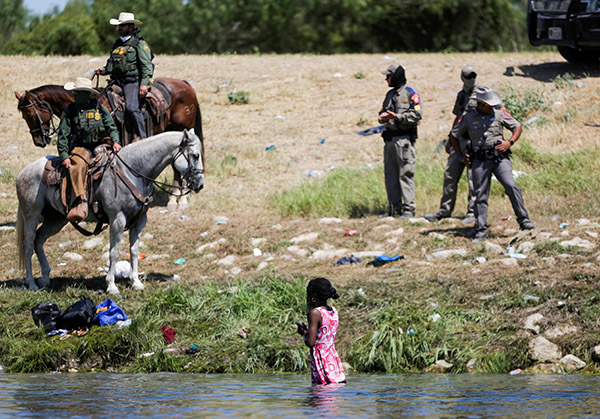
WINDSOR TERRACE — Haitian leaders from the Diocese of Brooklyn traveled to Texas this week with a dual purpose: to aid newly arrived Haitian migrants in the U.S., and to better understand their needs in preparation for their possible arrival up north.
“The purpose of the trip is to help out, but it’s also about having tons of knowledge on the situation,” said Father Hilaire Belizaire, coordinator of Haitian ministry for the Diocese of Brooklyn. Goals include “meeting the people, seeing what their needs are, and getting a sense of what to expect.”
[Related: Removed From Del Rio, ‘Border Crisis’ Poised To Spread in U.S.]

Father Belizaire, who is also the pastor of Sacred Heart of Jesus Parish, Bayside, is traveling alongside Deacon Jean Rameau from Catholic Charities Brooklyn and Queens, Elsie Saint-Louis, executive director of Haitian Americans United for Progress (HAUP), and others.
Saint-Louis said the organization is preparing for an influx of Haitian migrants to New York in the coming weeks. She acknowledged that some are already on their way after having gone through the preliminary immigration process, and several have already arrived. Shelter, social services, healthcare, integration services for children, and speech interpretation — to steer migrants through the “long haul” of getting their papers in order — are among the services HAUP and other shelters are preparing to offer, she said.
“We’re heading [to Texas] … so that we have an idea of who’s coming our way and working with our staff from there. That’s all we can really do because we really don’t have solid data or demographics of who’s coming,” Saint-Louis said.
The projected influx of Haitian migrants to New York — which has one of the largest Haitian populations in the U.S. — stems from the unprecedented situation in Del Rio, Texas. Over the past two weeks, some 30,000 migrants made their way into that border city from Mexico. At the peak of the crisis, there were as many as 15,000 migrants camped under the city’s international bridge. Those camps were cleared by Sept. 24.
As the reports of the situation in Del Rio became headline news, diocesan leaders called it a “humanitarian crisis” and a “nightmare.” The concerns included images of border patrol agents on horseback deterring Haitian migrants from crossing the Rio Grande River; inhumane living conditions in makeshift encampments; and removal flights sending hundreds back to a country stricken with earthquake damage and political turmoil.
Bishop Nicholas DiMarzio of Brooklyn has called the images coming out of Del Rio “heartbreaking.”
“I’m not saying they’re not crossing the border illegally, but that doesn’t mean that they’re ‘illegal,’ ” Bishop DiMarzio said. “They’re human beings. You can’t characterize them in that way.”
He added, “We should be offering a helping hand instead of waving the hand saying disappear, go away.”
Bishop DiMarzio especially lamented the images of border patrol agents on horseback pushing the migrants back, saying: “They’re not cattle. They’re human beings and we’re not treating them with human dignity and respect.”
Msgr. Pierre-André Pierre, who leads the National Haitian Apostolate, said the situation is a direct result of the ongoing humanitarian crisis in Haiti — both in recent months with the assassination of nation’s president Jovenel Moïse in July, and a 7.2 magnitude earthquake in August — as well as tragedies that have happened months and years before.
Many of the migrants who arrived in Del Rio came from Central America, where they had taken up residence after fleeing the aftermath of Haiti’s 2010 earthquake. Reports indicate they chose to come now under the erroneous belief that the U.S. was opening its border to them.
Msgr. Pierre called what he saw out of Del Rio “a real nightmare.”
“Here in the U.S., we need to help them fulfill their dreams in this humanitarian crisis,” Msgr, Pierre said. “From our side, the Haitian Apostolate, we are shocked and very concerned about this situation and the treatment of these brothers and sisters.”
Father Belizaire, Saint-Louis, and others embarked on their trip in Houston and went south from there. Saint-Louis said it’s also going to be important to understand the inhumane conditions the migrants lived in and the trauma they experienced on their journey to the border; that will help to establish mental health services to provide “the support they’re going to need to move on to the next step.”
In the long term, Bishop DiMarzio said the federal government needs to improve its ties with Latin American countries. At the top of the list should be Mexico, he said, because this situation shows that “we don’t have a very good relationship” if there was no warning about the influx.
“Migration is an international problem. No one country can control or deal with migration alone,” Bishop DiMarzio said. “We need to have better relationships with other countries in Latin America and other countries in general; otherwise, we will always deal with this on a shoot-from-the-hip basis where we don’t really understand what we’re doing.”
